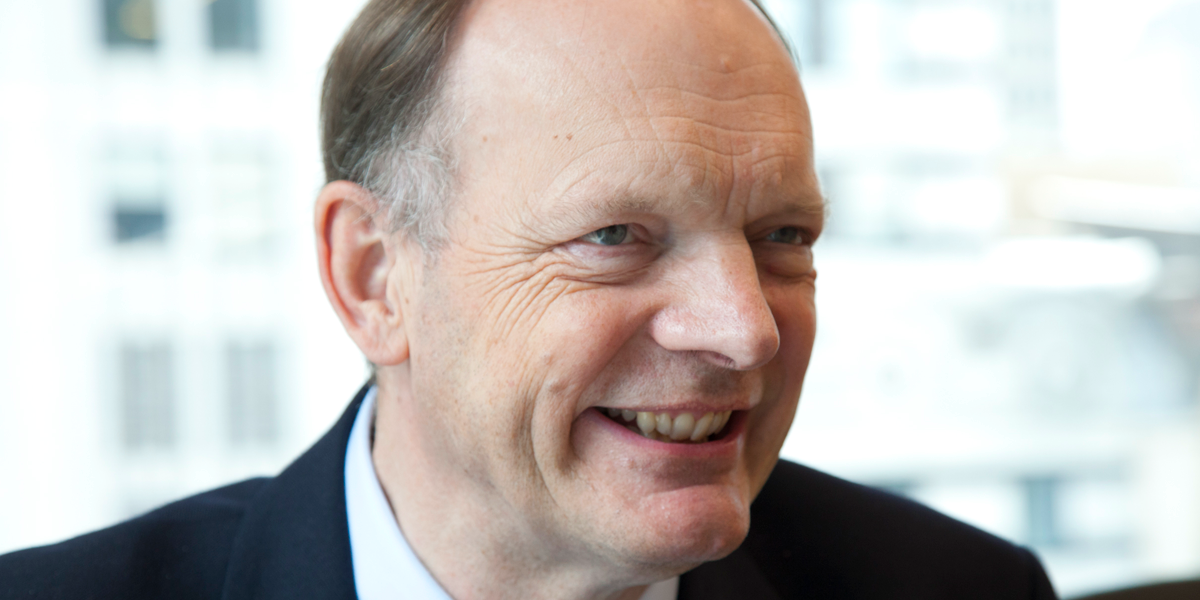Sitting down with Sir David Lane
Ludwig’s new scientific director on the benefits of unexpected scientific collaboration.
An internationally recognized leader in the field of tumor suppressor biology and a strong voice in the battle against cancer, his pioneering research led to the discovery of a tumor suppressor gene, p53, which he named the “guardian of the genome.” Knighted for his services to cancer research, he served as Cancer Research UK’s first chief scientist. Avrion Mitchinson, with whom he did his PhD in immunology, still refers to him as “the best student I ever had in University College.” This gifted scientist is David Lane, the Ludwig Institute’s new scientific director. We had a chance to sit down with him and chat about his role.
Why did you want to join the Institute?
Having worked on the Scientific Advisory Committee and the Board of Directors for a number of years, I got to know the Institute very well. And I have to say, it’s a pretty amazing organization. I’ve been able to see firsthand how its scientists carry out outstanding research—all the way from basic to clinical research. Ludwig supports its scientists with long-term funding, which gives them the ability to tackle big problems. They have great resources and the infrastructure to do their research at the very highest level, which accounts for the extraordinary contributions Ludwig scientists have made to cancer research.
What are Ludwig’s greatest strengths?
Independence. We choose exactly how we want to spend our resources for the best possible outcome. We support really outstanding science and make sure it gets translated—it doesn’t just get stuck in a journal, but is further developed and evaluated so that it has the potential to help patients.
And speed. So often we see an opportunity but it takes years of grant writing before it can happen, whereas at Ludwig, one of our scientists can come to us and say, “This is a fantastic opportunity for a clinical trial,” and we can quickly evaluate whether to pursue it. Similarly, if someone comes and says, “This is a piece of equipment we really need; it’s really going to transform how we’re doing our research,” we’re able to make the decision quickly on whether to buy it or not.
Where do you think Ludwig has a unique opportunity with regard to funding and how it can support research?
The current funding climate for science worldwide is very challenging. And the consequence is that ‘the butter is being spread rather thinly’—so individual scientists are competing harder for rather limited funds. And because that results in an extreme level of scrutiny, the type of grants that get funded tend to be the more conservative ones. Ludwig needs to continue to counter those trends. We have great faith and trust in our scientists, and give them enough resources to do outstanding work and sustain that investment so they can take risks. No one can predict what kind of research will ultimately lead to big breakthroughs. The tremendous progress in immune therapy has come from 30-plus years of basic research on the immune system, and nobody could have predicted the impact we are now seeing. So we have to sustain that sort of long-term investment and go for excellence. And when we see excellence, support it. Really nourish our shoots and make sure they flower.
How do you plan to begin at Ludwig and help advance its cancer research programs?
Getting to know everyone well is my number-one priority. There’s no substitute for personal contact. I’m a scientist myself, a very active scientist. I love science and I think that puts me in a position where I can understand what people are doing and why they’re doing it—while helping people interact with each other and promoting collaboration. Much of the best science comes from unexpected collaboration. Fostering an atmosphere where people feel happy and comfortable working with one another, and making sure they know they are going to be supported, is on my radar.
Will it be tough juggling two roles?
Over the years, I’ve had to master the art of using my time efficiently, and juggling multiple roles has become second nature to me. I was chief scientist at Cancer Research UK while working with A*STAR—and at one point simultaneously running a biotech company as well as holding a university job.
What are some of the challenges you face?
Institutions like Ludwig have really captured the world’s attention by showing that cancer can become a treatable disease. We need to continue to do research that deepens our understanding of the disease and discover and develop new therapies to help patients. Our researchers have been and will remain a part of the revolution that shifts cancer from a death sentence into a manageable disease.
Final words of wisdom?
We all need to keep the faith. Science is hard and long and what Ludwig has achieved is just tremendous. Progress over the past 40 years by the entire Ludwig community now provides unprecedented opportunities to translate current discoveries into improved patient care. We are at a pivotal juncture with the potential for significant gains in the near future. And we’re going to continue to be one of the leaders in developing new therapies and new approaches to cancer treatment while constantly striving to understand the disease better.
